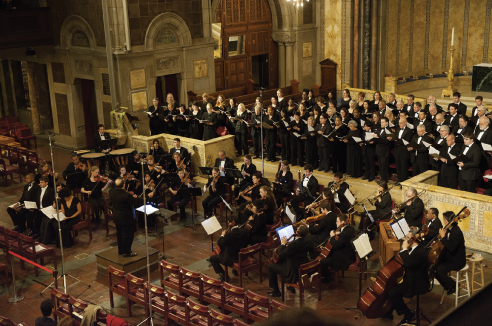The positive healing effects of music can be traced as far back as ancient Greece and the belief that Apollo was God of medicine and music. In his book De Anima, Aristotle wrote that flute music could purify the soul. By the end of the 19th century, researchers were showing a correlation between the use of music and its healing effects on patients in lowering their blood pressure, decreasing pulse rate, and increasing cardiac output. Today, music therapy is used as part of complementary care in the treatment of cancer—as well as other diseases—to help salve patients’ fears and anxieties and increase feelings of relaxation and calm.
The alluring power of music seems to extend to the practitioners of medicine as well. Last October, over 100 doctors, researchers, nurses, medical students, and other medical professionals from New York–area hospitals, including Memorial Sloan-Kettering Cancer Center, NewYork-Presbyterian Hospital/Weill Cornell Medical Center, and Rockefeller University, performed their first concert together, Mozart’s Requiem, to a sold-out audience at St. Bartholomew’s Church in Manhattan. The performers, members of the Music and Medicine Orchestra and Chorus (Fig. 1), are part of the Music and Medicine Initiative formed by Weill Cornell Medical College 4 years ago and comprise levels of musical ability from serious amateurs to conservatory-trained professionals.
Origins of Initiative
The idea to launch the Music and Medicine Initiative grew from an observation that many applicants to Weill Cornell Medical College had a background in music. “I’m on the Admissions Committee, and I interview applicants to the Medical College,” said David A. Shapiro, MD, Clinical Professor of Psychiatry at Weill Cornell Medical College and Founder and Chairman of the Music and Medicine Initiative. “It soon became clear to me that a significant number of the applicants—between 20% and 25%— had some degree of interest in music, from minor enthusiasts to graduates of conservatories.”
One of those applicants was Jenna Devare, now a fourth-year medical student, who is also a gifted violinist and helped organize the Music and Medicine Orchestra and Chorus and was among the Requiem concert performers. The concert was so well received, one attendee, famed neurologist and author Oliver Sacks, told New York magazine he was “carried away” by the performance and “thinking that I would like a performance of it in front of me as I was dying.”
The concert raised enough money to cover expenses and provide $10,000 to fund the student-led Weill Cornell Community Clinic, which provides free medical and psychiatric care to uninsured New Yorkers.
“The Clinic serves approximately 175 patients per year and has an annual operating cost of about $40,000. The money we’re donating will significantly help fund the Clinic’s annual costs,” said Ms. Devare.
Mysterious Link
Although there appears to be a clear link between the parallel pursuits of music and medicine, exactly what that link is remains a mystery. Some brain science studies have explored the music/medicine connection, “but we don’t have any answers yet,” said Dr. Shapiro, who plays percussion instruments in a jazz group. “What we’ve noticed about our students and musicians is that these are very hard-working people who are very dedicated to these tasks, and the idea of practicing is a concept that is shared by both professions. These are people with a capacity to achieve a certain kind of excellence.”
A look at the list of names on the Music and Medicine Initiative’s advisory board does in fact read like a Who’s Who of the best and brightest medical and musical talent in New York, including Richard Kogan, MD, Co-Director of the Human Sexuality Program at Weill Cornell Medical College and Vice Chairman and Artistic Director of the Music and Medicine Initiative. Dr. Kogan is also a concert pianist.
“Dr. Kogan is a graduate of the Juilliard School of Music and roomed with Yo-Yo Ma at Harvard. Hand injuries in undergraduate school led him to take a detour [in his musical pursuits], and he went to Harvard Medical School to study medicine,” said Dr. Shapiro.
Larry Norton, MD, Deputy Physician-in-Chief for Breast Cancer Programs at Memorial Sloan-Kettering Cancer Center and Medical Director of the Evelyn H. Lauder Breast Center, is also a member of the Music and Medicine advisory board and a serious musician. Dr. Shapiro called Dr. Norton when he was launching the Music and Medicine Initiative.
“Dr. Norton plays about 10 instruments and can’t imagine his life without being a musician. He was immediately onboard with the Initiative,” said Dr. Shapiro.
Integrating Music and Medicine
The current plan is for the Music and Medicine Orchestra and Chorus to perform one or two major concerts a year. In addition, many of these medical students are developing ways to integrate their two passions into their daily lives, such as performing at patients’ bedsides and holding monthly mini-concerts for those in need of palliative care.
For more information about the Music and Medicine Initiative, visit weill.cornell.edu/music. ■


